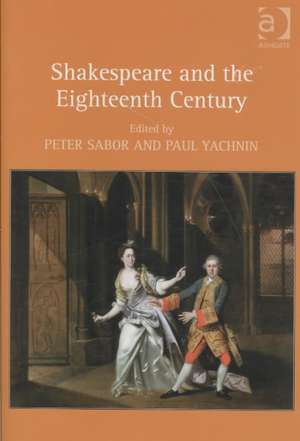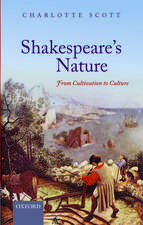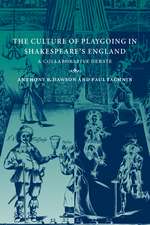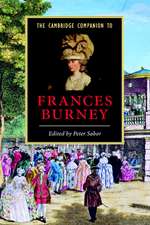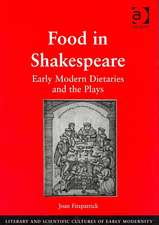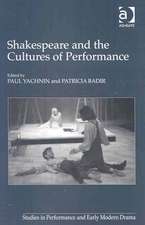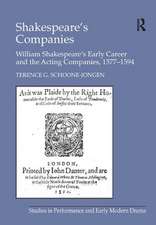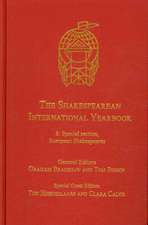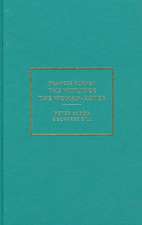Shakespeare and the Eighteenth Century
Editat de Peter Sabor, Paul Yachninen Limba Engleză Hardback – 28 sep 2008
| Toate formatele și edițiile | Preț | Express |
|---|---|---|
| Paperback (1) | 469.34 lei 6-8 săpt. | |
| Taylor & Francis – 15 noi 2016 | 469.34 lei 6-8 săpt. | |
| Hardback (1) | 1054.71 lei 6-8 săpt. | |
| Taylor & Francis – 28 sep 2008 | 1054.71 lei 6-8 săpt. |
Preț: 1054.71 lei
Preț vechi: 1286.24 lei
-18% Nou
Puncte Express: 1582
Preț estimativ în valută:
201.82€ • 219.91$ • 170.06£
201.82€ • 219.91$ • 170.06£
Carte tipărită la comandă
Livrare economică 23 aprilie-07 mai
Preluare comenzi: 021 569.72.76
Specificații
ISBN-13: 9780754662952
ISBN-10: 0754662950
Pagini: 202
Dimensiuni: 156 x 234 x 13 mm
Greutate: 0.45 kg
Ediția:1
Editura: Taylor & Francis
Colecția Routledge
Locul publicării:Oxford, United Kingdom
ISBN-10: 0754662950
Pagini: 202
Dimensiuni: 156 x 234 x 13 mm
Greutate: 0.45 kg
Ediția:1
Editura: Taylor & Francis
Colecția Routledge
Locul publicării:Oxford, United Kingdom
Cuprins
Contents: Introduction, Peter Sabor and Paul Yachnin; Part I Theorizing Shakespeare in the 18th Century and Beyond: 'A system of oeconomical prudence': Shakespearean character and the practice of moral inquiry, Michael Bristol; Shakespeare and sympathy, Jean Marsden; The 'vexed question': Shakespeare and the nature of middle-class appropriation, Nicholas Hudson. Part II 18th-Century Editors and Interpreters: The influence of the female audience on the Shakespeare revival of 1736-1738: the case of the Shakespeare Ladies Club, Fiona Ritchie; George Steevens and the 1778 Variorum: a hermeneutics and a social economy of annotation, Marcus Walsh; William Shakespeare and Edmund Burke: literary allusion in 18th-century British political rhetoric, Frans de Bruyn; Fairy time from Shakespeare to Scott, Marcie Frank. Part III 18th-Century Adaptation and Reception: Looking for Richard II, Paul Yachnin; Awful pomp and endless diversity: the sublime Sir John Falstaff, Amanda Cockburn; Looking for 'Newtonian' laws in Shakespeare: the mystifying case of the character of Hamlet, Gefen Bar-On Santor; Why girls look like their mothers: David Garrick rewrites The Winter's Tale, Jenny Davidson; Index.
Notă biografică
Peter Sabor is Canada Research Chair in Eighteenth Century Studies and Professor of English, and Paul Yachnin is Tomlinson Professor of Shakespeare Studies in the Department of English, McGill University, Canada.
Recenzii
'This fine collection of nuanced essays complements - and often challenges - the dominant late twentieth-century rhetoric of eighteenth-century appropriation, shifting the debate from a prescriptive reading of Shakespeare as ideological tool to a more sophisticated discussion of skill and influence that relocates text, performance and reception in the literary, aesthetic and cultural history of the period through a consideration of the relationship with the past. It deserves a wide readership.' Catherine M.S. Alexander, University of Birmingham, UK ’Peter Sabor and Paul Yachnin's excellent collection... this fascinating set of essays surpasses its remit... illuminating the diverse ways of talking about Shakespeare in the eighteenth century, this collection will open up new conversations about his reception in the future.’ Times Literary Supplement 'The cumulative weight and depth of this collection of essays underscore the ideological and social differences in the theatrical and literary environment of the Elizabethan age and the Enlightenment. This volume is a welcome addition to the spirit of enquiry so prevalent in its subject matter.' Restoration and Eighteenth-Century Theatre Research
Descriere
This fascinating volume brings together Renaissance and eighteenth-century scholars who examine how Shakespeare gradually penetrated, and came to dominate, the culture and intellectual life of people in the English-speaking world. Approaching Shakespeare from a wide range of perspectives, including philosophy, science, textual practice, and theatre studies, the contributors paint a vivid picture of the relationship between eighteenth-century Shakespeare and ideas about shared nationhood, knowledge, morality, history, and the self.
